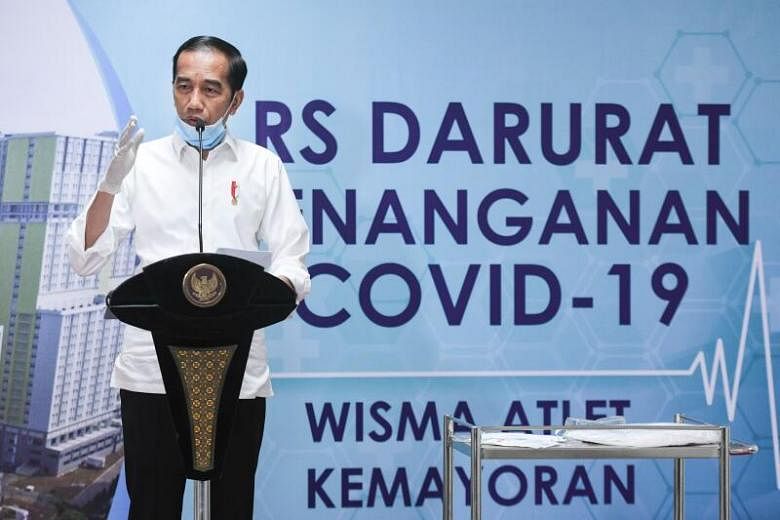JAKARTA - Indonesian President Joko Widodo said on Monday (April 13) that the economy and social stability are key in tackling the coronavirus outbreak. The informal meeting with the foreign media took place in his office as the country ramps up its testing capacity by at least four times and while the number of infections continues to rise.
This week will see Indonesia rolling out its major social programme to help support millions of its most affected citizens by the increasing spread of the coronavirus.
"The social programme would help bring people to a calm," Mr Joko said, referring to concerns expressed in Indonesia and overseas about the public health crisis leading to social instability.
Police said this past weekend that five people were arrested for allegedly instigating others to commit arson and looting, as the poor grapple with declining income due to the coronavirus pandemic. The culprits, arrested on Friday, are part of a group that was orchestrating planned chaos for later this week in several cities across Java, the site of about 80 per cent of Indonesia's confirmed Covid-19 cases.
Dismissing criticism that his government had taken this situation lightly, Mr Joko stressed that the government has been tackling the Covid-19 crisis seriously from the beginning and said that equal attention should be given to address both the health side and the socio-economic aspect of the problem.
"The coronavirus and the economy are highly related. They both are important. If people don't eat, the economy would collapse," Mr Joko said.
The government has taken an extraordinary measure to book a budget deficit of 5 per cent of the GDP this year, higher than the normal threshold of 3 per cent, as it tries to mitigate the effects of the pandemic.
Mr Joko said if the crisis continues beyond six months, the government may have to accept an even higher budget deficit.
The President also said he told his ministers to not project a sense of emergency to the public so as to avoid creating panic.
"If panic among the public ensues and all the people rush to hospital, even a country with the best health system would face a breakdown. We chose to remain calm but tackle the crisis seriously," he said.
Twenty million financially vulnerable Indonesians will get stable food supplies. Workers affected by layoffs and daily wage earners will get cash transfers, said Mr Joko, who is popularly called Jokowi at home.
Mr Joko also pointed out that Indonesia's testing capacity is currently at 2,200 polymerase chain reaction (PCR) tests a day and could gradually increase fourfold. Indonesia has administered a total of 27,000 PCR tests.
Indonesia had ordered and recently received 18 units of Roche equipment to read PCR samples . Three of them will start operating this week. Each can analyse 500 PCR tests a day.
"We have new equipment that can do rapid PCR tests. We will be able to do more than 9,000 PCR tests a day, provided the reagents do not arrive late," Mr Joko said in reply to The Straits Times' question during Monday's informal discussions with four foreign media organisations.
ST understands that Indonesia, like many other countries, is competing to get reagents - chemicals that need to be mixed with the PCR samples during testing - that have gone scarce all over the globe.
International competition for the procurement of medical equipment and hazmat suits has been so intense that Indonesia saw its orders cancelled as they were hijacked by other countries on several occasions, Mr Joko said.
The world's fourth-most populous country of nearly 270 million people registered another 26 deaths within the past 24 hours on Monday (April 13), bringing the total number of fatalities to 399. About 80 per cent of the deceased were patients with pre-existing conditions such as high blood pressure, according to Mr Joko. As many as 4,557 people have tested positive.
In summarising the global effect of the Covid-19 pandemic, Mr Joko said: "Production, supply and demand have broken down."












